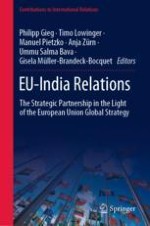2021 | OriginalPaper | Chapter
Between Competition and Cooperation: The EU Global Strategy as Means to Reinvigorate EU-Indian Cooperation?
Activate our intelligent search to find suitable subject content or patents.
Select sections of text to find matching patents with Artificial Intelligence. powered by
Select sections of text to find additional relevant content using AI-assisted search. powered by
